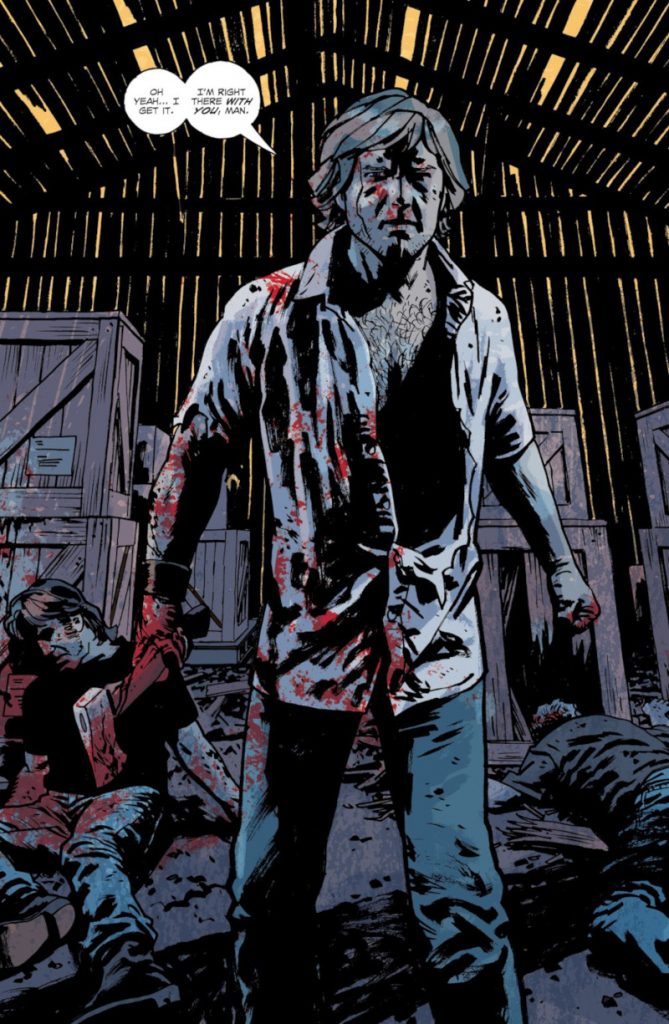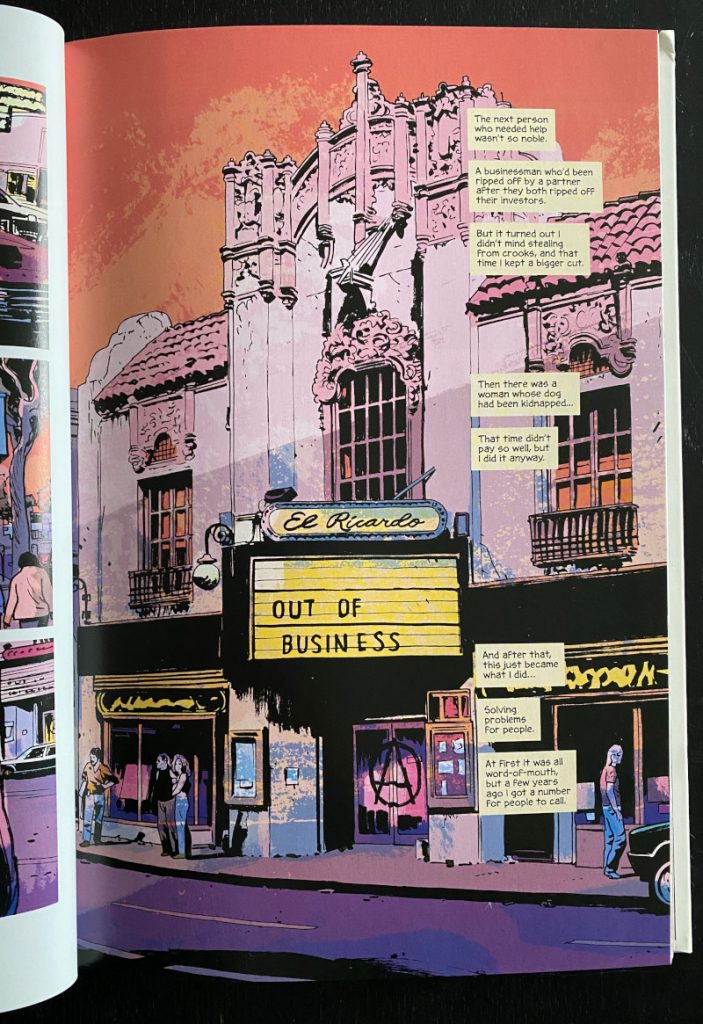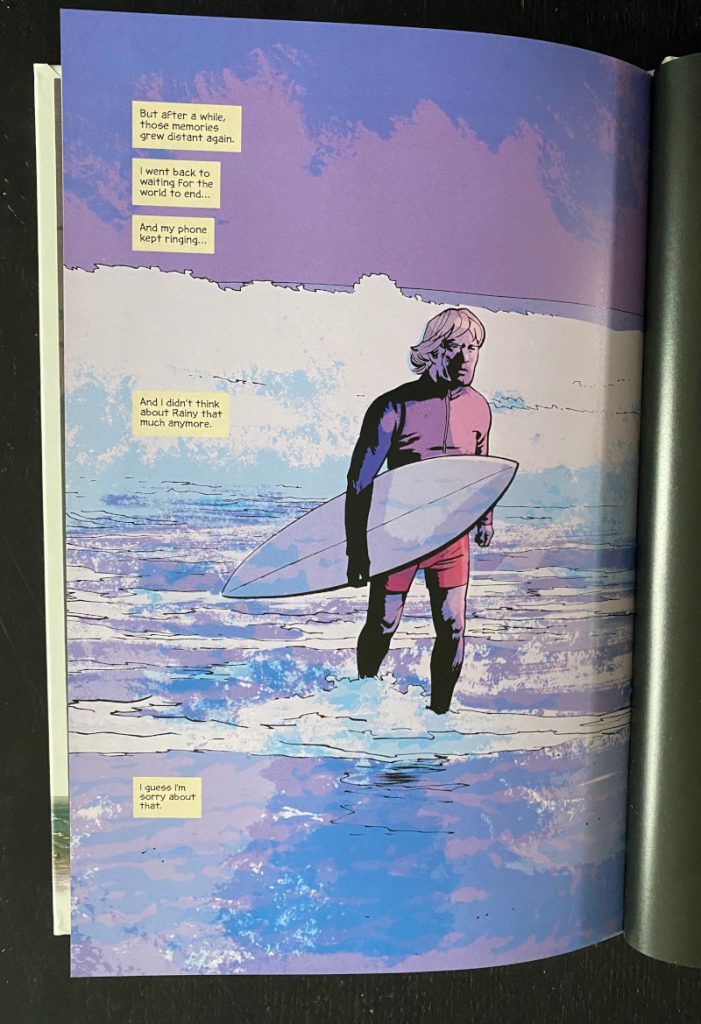The Little Things: Brubaker and Phillips Find Room to Roam in Reckless
The Little Things is a semi-regular column in which I celebrate the, you guessed it, little things that make specific comics or creators from today great. Now, if we’re being honest, the factors that make a story exceptional are often considerable. Many of them are big and hard to miss. Those are the beats that make the rounds on social media as we all exclaim, “Look! Look at how genius this person is!” Those are wonderful, but this column isn’t about those. Instead, it’s about the storytelling decisions that have a major impact in a less obvious way. Like I said: the little things.
Saying Ed Brubaker and Sean Phillips are good at making comics is a Grade A Captain Obvious take.
That’s like saying “food is great!” or “Tom Brady seems effective at football.” It’s so clear to everyone that it’s true that it almost doesn’t need to be said.
And yet, here I am, saying it all the same: Ed Brubaker and Sean Phillips are good at making comics! In fact, I’d argue that their new project – Reckless, an ongoing (and currently through three volumes) run of hardcover graphic novels about Ethan Reckless, a badass with a heart of gold who rights wrongs for money (or real estate!) – has revealed that yes, they are good at making comics, but they also are still capable of finding new ways to succeed thanks to the format shift they’ve taken on over this span. 11 That is, to a degree, the focus of this column today. It isn’t just the little things that makes the larger Reckless series exceptional, but the advantages this sequential graphic novel format affords them as storytellers. Yes, it’s obvious. Brubaker and Phillips are always great. But in Reckless, they feel unencumbered, as the space has unleashed them to a degree.
We’ll be looking at not just the first book from the series, Reckless, but also the second and third volumes, Friend of the Devil and Destroy All Monsters, each of which they’re rolling out at a shocking rate with colorist Jacob Phillips. There will be mild spoilers within the focus points, but they will deliberately lack context. So as far as spoilers go, they’ll be effectively meaningless, for the most part. They also won’t be the point. When it comes to The Little Things, the showcase pages and panels aren’t about what happens on them as much as what it says about the work.
There’s a lot of them, so enough prelude. To the little things!

Preview/Intro (from Reckless)
Starting new stories at their conclusion – or at least in media res so we have a feel for where the story is going to go – isn’t entirely new for this crew. It’s common for them to open in such a way, even on single-issue titles like Kill or Be Killed. That’s a structural norm for their works. So, each Reckless volume having that approach isn’t unusual for Brubaker and the Phillipses.
That said, the way they do this in Reckless seems to be a smidge different, and in a way that perfectly fits both the narrative and standard promotional approaches in comics. So far, each of the volumes opened with a four-page intro that shows series lead Ethan Reckless in a rather precarious spot. 12 While they act as effective setup for everything that’s to come, they are also structured as perfect introductions to the volume once you’re reading it as well as isolated teasers for those examining the tome in a book store or on a website that’s sharing preview pages. They aren’t real spoilers as much as something designed to build anticipation, establish flavor, and to whet your appetite for what’s to come. In short: they work equally well for the reader of today and the buyer of tomorrow. That’s a tough line to walk.
This feels like something the team has refined over the years as they worked together. Working on issue after issue and volume after volume, they made it to this new format and seemingly realized that this is the right method of introducing a story for them, for their audience, and for potential new readers. It works exquisitely, and in a way that wouldn’t jive with single-issue comics, as taking four pages of 20 to tease the end of each issue would just feel inefficient there. In a 144-page book? It’s perfection.

Planting Seeds (from Reckless)
This is on page nine of Reckless, the first graphic novel from the series. It’s the first time we see Ethan’s base of operations, the El Ricardo, an old movie theater that operates as his home and domain for limitless movie watching. 13 And on this page, a crucial story beat is introduced without us realizing it – that’s the “A” on the door that simultaneously represents Anarchy and the person who put it there – while on the next one, the title of the third volume was foreshadowed, even if it was more of a tie to the theater and a mission statement of sorts at the time. In single issues, Brubaker and Phillips have always been able to work in details that can pay off later on. But in that form, they’re reliant on reader memories as much as their own gifts. It’s easier now with how they’re making this series.
With the simultaneously graphic novel format and sequentially structured Reckless, the team can plant seeds from day one and wait to reap the storytelling benefits later. Sometimes that manifests itself in visuals, whether it’s that door or a movie poster. Sometimes it’s in Ethan’s narration, which Brubaker made the wise decision to be delivered from a present that’s in the far future – also known as our present, effectively – allowing him to nod to things still to come.
The length of each volume and ongoing nature of these graphic novels allows the team the real estate to consider details like this from the jump and to move forward with threads as they feel like it. That’s smart. They can even move forward or backward in chronological order if they’d like – I’m not sure if they’ll do that, but it feels like an option – and to tap into cases that appeal or character beats that are alluded to earlier on. Everything is on the table. It makes each volume all the richer for it, as they become ripe for rereads due to the events of each new book that drops.

Foreplay/Long Time (from Reckless)
There are a lot of strengths to the Reckless series as a whole, but maybe its greatest – with significant emphasis on maybe – is Brubaker’s narration.
Here’s a quick aside. Remember Memento, the Guy Pearce + Christopher Nolan jam from…oh my god, 21 years ago?! 14 It came out in 2000, and there’s one line in it that has always stuck with me. It’s at the beginning of a scene, and Pearce’s Leonard Shelby’s short-term memory has just reset. He’s holding a bottle of liquor, and the first line of narration from him is, “Hmmm…I don’t feel drunk.” I always loved that. That’s because it’s simultaneously Leonard parsing out his situation and a perfect example of the casual, internalized thinking people actually do.
Brubaker nails that vibe in Reckless. It’s being narrated from the future – or…sort of narrated, as it turns out to be – and the narration is the right mix of propulsive and personal, fueling the story but also tethering us to Ethan as an individual. It beautifully sets things up in the present and acts as an old man confronting his memories, regretting the things he did or didn’t do, even if what he feels about them is truly minimized by an injury he sustained long ago. It’s the perfect blend of short-term and long-term thinking within the narration. I love it.
Also, take the page above as an example. It’s the final page of Reckless, and despite that, it really contains no spoilers beyond *spoiler alert* Ethan likes to surf! But the way the narration is handled, both as it’s written and in the lettering, is exemplary. It’s a great example of how the pain of memories can dull over time, and how that in itself causes regret within us. The lack of pain can cause it in its own way. It’s a, forgive me for my dramatics, poetic bit of writing, all elevated by how Phillips letters it, as he chooses to deliver it with significant space between the final two bits. In a single issue comic, you might not be able to pace everything out so deliberately. But this is a graphic novel, so they’re able to spread things out. So when the last line hits, you feel the regret in the line really pop, even if it’s muted due to who is delivering it. It’s exemplary teamwork, and comic booking in its highest form.
subscribers only.
Learn more about what you get with a subscription
Along with their graphic novellas My Heroes Have Always Been Junkies and Pulp.↩
See: the above page from the first book. That’s not his blood, at least.↩
Watching movies is an essential part of this series.↩
Sorry, I just learned that in real time.↩
Along with their graphic novellas My Heroes Have Always Been Junkies and Pulp.↩
See: the above page from the first book. That’s not his blood, at least.↩
Watching movies is an essential part of this series.↩
Sorry, I just learned that in real time.↩
That’s a guess! I did not count, but it’s a decent chunk.↩
Partially because it’s morning, something that both reflects the warmth of the couple and how Ethan is actually sleeping properly now!↩
Along with their graphic novellas My Heroes Have Always Been Junkies and Pulp.↩
See: the above page from the first book. That’s not his blood, at least.↩
Watching movies is an essential part of this series.↩
Sorry, I just learned that in real time.↩
